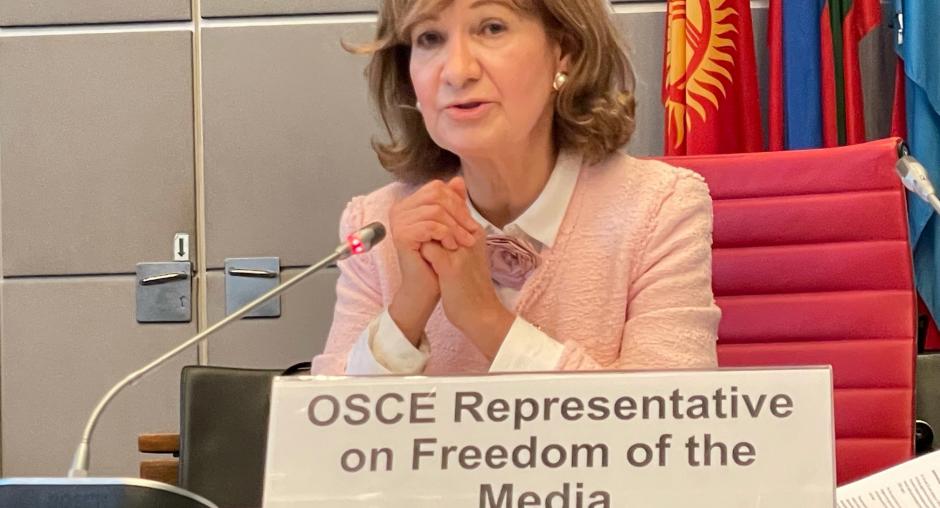Media freedom situation deteriorated all over the region, said OSCE Media Freedom Representative at Permanent Council meeting in Vienna

VIENNA, 25 November 2021 – The media freedom situation in the OSCE region has not improved since her previous report six months ago, said OSCE Representative on Freedom of the Media (RFoM), Teresa Ribeiro, during the presentation of her second biannual report to the OSCE Permanent Council in Vienna today.
In some cases, developments have even worsened and the problems deepened, the Representative stated, adding that the decline in media freedom is not confined to just a few of the participating States. Ribeiro: “Although some of the developments have a regional aspect, there are also trends that impact media freedom across the whole region, affecting us all in a similar way.”
Distrust against the media and anti‐media sentiment is on the rise in the OSCE region. This development is sparked by several factors, including actions by certain authorities who want to sow doubt in order to cover up their anti‐democratic tendencies and deeds. Ribeiro stated: “In a Joint Declaration with other international media freedom rapporteurs in October, we denounced the rising tide of dangerous, hateful public statements coming from some politicians and public officials. Such rhetoric spreads intolerance and divisiveness and threatens or encourages attacks on journalists, human rights defenders, and puts minorities at risk.”
Mirroring this distrust and anti-media sentiment, there was again a large number of physical attacks against journalists including against those who were reporting on public gatherings. “Sadly, since my last report three journalists were killed in our region,” the Representative added. “I would like to take this opportunity to express again my deepest condolences to their families and colleagues.”
Next to physical threats, media workers and outlets continue to experience severe consequences of abuse and harassment via other means. There were increasing challenges in the online sphere, including the impact of disinformation and hate speech, harmful business practices that rely on the use of artificial intelligence, and the online harassment of – oftentimes women – journalists. In addition, many media workers and media outlets came under the threat of abusive and vexatious legal procedures. Ribeiro said: “Legal harassment poses a serious threat to the safety of media and the economic basis of outlets and has a strong chilling effect on media pluralism in the OSCE region.”
The ability of journalists to pursue their work across borders was hampered again, in some cases again severely, during the past six months. Ribeiro stated: “I want to reiterate that media freedom is dependent on a vibrant and competitive media landscape, with a variety of voices. This includes freedom to perform journalistic duties abroad – something that is also considered crucial for strengthening a climate of trust and co-operation within the OSCE region.”
In 2022, the year RFoM celebrates the 25th anniversary of its Mandate, a number of different initiatives will be employed to enhance the media freedom situation in the OSCE region. This includes taking stock of the parts of the commitments that the participating States still have to fulfil in order to enhance the safety of journalists, including by developing national action plans or strategies, or by strengthening national data collection and analysis of threats and attacks. A project to provide assistance in the development of media literacy approaches will be started, in order to empower individuals, equipping them with the necessary skills to distinguish disinformation, misinformation and fake news from reliable news and to convey them not to be producers of such content.
Next, an advisory group of eminent persons will be established, to assess current challenges regarding media freedom, anticipate key developments in years to come and propose ways to address the impact of these challenges on the right to seek, receive and impart information as a core concept of comprehensive security. This group will focus on three overarching themes, including political trends and the way they impact media freedom; economic and environmental factors affecting media freedom; and digital transformations shaping the media landscape.
The Representative’s full report is available here: https://www.osce.org/representative-on-freedom-of-media/505564
Media are invited to contact the Office of the OSCE Representative on Freedom of the Media for questions and interview requests.
The OSCE Representative on Freedom of the Media observes media developments in all 57 OSCE participating States. She provides early warning on violations of freedom of expression and media freedom and promotes full compliance with OSCE media freedom commitments. Learn more at www.osce.org/fom, Twitter: @OSCE_RFoM and on www.facebook.com/osce.rfom.
